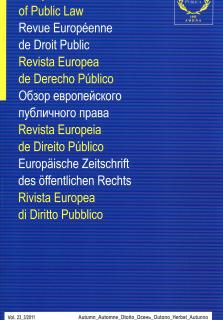
During the period 2009-2011, the Belgian State has been living by the rhythm of elections and political crises. Never has the political life of the country been thus hectic. The June 2009 regional and European elections have been followed, a few months later, by the appointment of Prime Minister Herman Van Rompuy as President of the European Council. The following year, a profound political crisis led to snap elections. The difficulty of reconciling the concerns of the winning parties prevented the immediate formation of a full-exercise government. Disagreements regarded mainly the extension of regional competencies. Discussions proceed as far as three issues are concerned: the functioning of justice, healthcare and employment. This rebalancing of competencies might incite, sooner or later, a reexamination of the status of certain public authorities. The King, the Senate and the Constitutional Court are subject to these reflections. However, three classical questions reappear. They regard the functioning of the legislature (power verification), of the executive (management of current affairs) and of the judiciary (the status of the Council of State). Finally, following the entry into force of the Lisbon Treaty, constitutional, legislative and regulatory reforms are necessary in order for the rules in force in the Belgian legal order to be in accordance with the new EU ones.
Au cours de la période 2009-2011, l’Etat belge vit au rythme des échéances électorales et des crises politiques. Jamais la vie politique du pays n’a été aussi mouvementée. Les élections régionales et européennes de juin 2009 sont suivies, quelques mois plus tard, par la désignation du Premier ministre Herman Van Rompuy au poste de président du Conseil européen. L’année suivante, une crise politique profonde entraîne des élections anticipées. La difficulté de concilier les préoccupations des partis vainqueurs empêche la constitution immédiate d’un gouvernement de plein exercice. Les désaccords concernent notamment l’extension des compétences régionales. Les travaux progressent dans trois directions: le fonctionnement de la justice, les soins de santé et l’emploi. Ce rééquilibrage des compétences peut inciter à réexaminer, à plus ou moins long terme, le statut de certaines autorités publiques. Le Roi, le Sénat ou encore la Cour constitutionnelle font l’objet de ces réflexions. Cependant, trois questions classiques reviennent à l’avant-plan. Elles touchent au fonctionnement du pouvoir législatif (la vérification des pouvoirs), du pouvoir exécutif (la gestion des affaires courantes) et des institutions de justice (le statut du Conseil d’Etat). Enfin, suite à l’entrée en vigueur du Traité de Lisbonne, des réformes constitutionnelles, législatives et réglementaires s’imposent pour accorder les nouvelles dispositions communautaires à celles en vigueur dans l’ordre juridique belge.





















